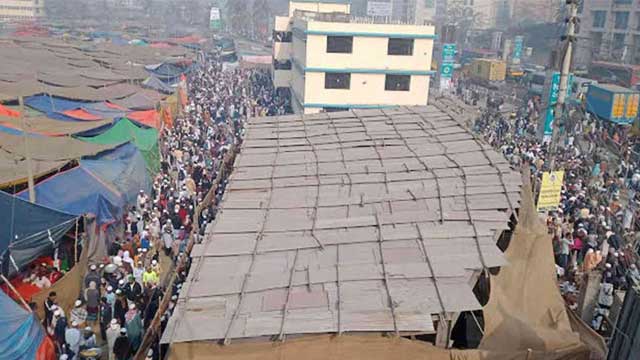The first phase of the main rituals of Bishwa Ijtema, the second largest congregation of Muslims, was held Friday morning.
Pakistan's Maulana Ziaul Haque started his Aam Bayan (sermons) after Fajr prayers.
Maulana Ismail Gudar will give sermons after Jumaah, Maulana Zubair Ahmad after Asr and Maulana Ahmad Lat after Maghrib. Their sermons will be translated into Bangla by Maulana Omar Farooq of Bangladesh.
Thousands of Tabligh members in small and large groups – all clad in tupee and punjabi – came to the banks of the Turag River in Tongi on Thursday and filled the place ahead of the Ijtema.
The worshipers who did not get a place on the Ijtema ground took position on the footpaths of the Dhaka-Mymensingh highway and in the open spaces around the ground.
On the other hand, sermons started ahead of the Ijtema on Thursday after Fajr prayers.
dt-adEminent scholars from Bangladesh, India and Pakistan will deliver sermons. This recitation of the six Usul of Tabligh will continue until the last prayer on Sunday.
Engineer Mahfuz, the head of the Ijtema organizing committee, said that a huge number of Tabligh Muslims have been coming to the Ijtema ground in groups since Wednesday and were taking their positions in the field. This influx of worshipers will continue until the last prayer.
The country's largest Jumma prayer would be held on the Ijtema ground around 1:30pm on Friday led by Maulana Zobair.
On the west side of the ground, the imam will stand on the platform built on the east side of the Turag river, and in the northwest, the orator will stand next to the foreign worshippers. The last prayer will be conducted from the stage. The Ijtema ground, comprising about 1 square kilometre, has been fitted with special microphones to listen to the prayers of the worshipers in the tents. Adequate electric lights have been installed.
Abdul Jabbar of Kechua village of Muktagacha, Mymensingh said: “I left two days earlier thinking that there might be trouble getting a place. Two years ago, in the last Ijtema, I had to sit on the road without getting a place in the field.”
Alamgir Hossain, a resident of Tangail's Sakhipur upazila, said that he had been coming to the Ijtema field for the past seven years. Last two years, he did not come to Dhaka as the Ijtema was not held.
As the Ijtema was closed for two years, the presence of Muslims this year may be more, so they came to the venue a day earlier, he added.
Foreign worshippers from Saudi Arabia and Europe have already taken up residence in the pandal of the foreign guests on the Ijtema ground. A separate accommodation with modern facilities is provided in the northwest corner of the grounds for foreign Tablighi followers.
Zaheer Ibn Muslim, who is in charge of coordinating the media of Zobair's followers, said that the worshipers started coming like streams in the morning. “We hope that there will be a record number of people this time. Electricity, gas and water supply, and pandal construction are all done by different groups.”
He also said that such a big event of Bishwa Ijtema is done in a very orderly manner every year. The entire Ijtema ground is arranged on the advice of the elderly people. On the ground, the location of Jillawari Muslims, the cooking area, toilet, ablution, and bath are all specified.
Deputy Commissioner Anisur Rahman said their executive magistrates would be on alert to prevent any mishaps.
Jahangir Alam, the supervisor of Shahid Ahsan Ullah Master General Hospital, said the health department had made all preparations to provide free health services for the participants. “Five camps have been set up on the Ijtema ground to provide free medicine and consultation,” he said, adding that seven specialist medical teams would be deployed for the Ijtema.
Alamgir Miah, the executive engineer of the Directorate of Public Health Engineering, said they had built 31 toilet buildings to serve around 9,000 people at the same time. Moreover, arrangements have been made for drinking water and uninterrupted power supply, while the Fire Service has been kept ready to tackle any situation.
Gazipur Metropolitan Police (GMP) Deputy Commissioner (Traffic) Alamgir Hasan said the traffic department has been divided into several sections.
GMP Commissioner Mollah Nazrul Islam said maximum security measures had been taken at the Ijtema Maidan and surrounding areas. “In two phases, more than 10,000 law enforcers will perform their duties,” he said, adding that they had set up 14 control rooms.





